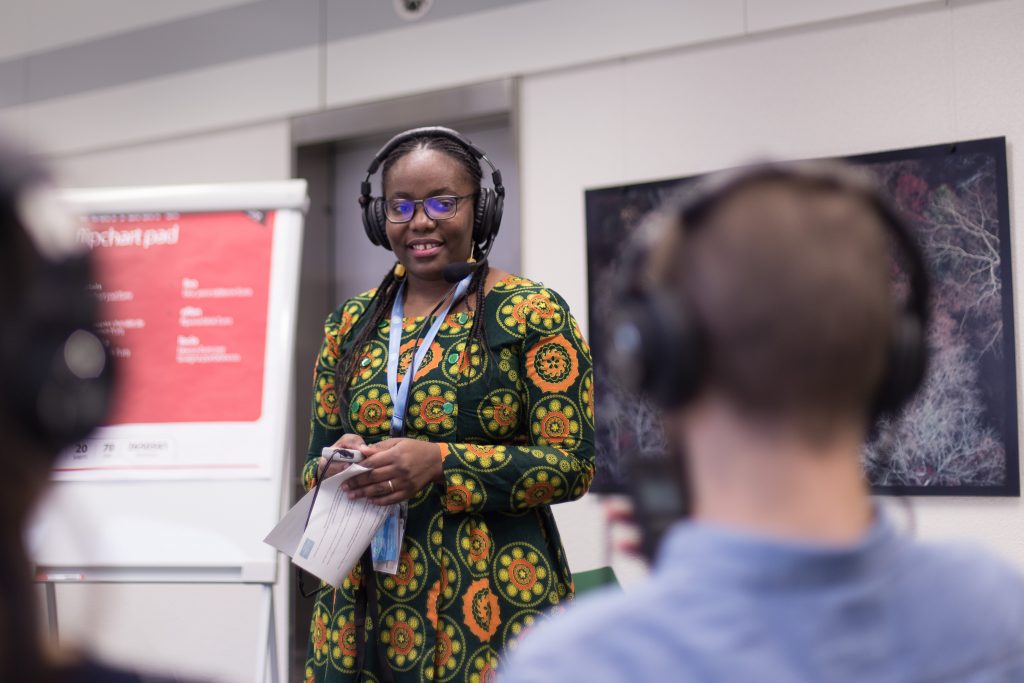Keeping abreast of the latest climate change developments is essential to make timely, effective and sustainable decisions. But it is difficult to find enough time and space for learning.
Our Climate Classrooms are ‘pop-up’ learning sessions held during major climate change conferences and similar events. Over roughly 45 minutes, participants, including negotiators and other delegates, learn key aspects of important climate change topics, directly from subject matter experts. The sessions are held in English and French.
During each class, the lecturer and about 20 participants are equipped with noise-canceling headsets so they can follow the lecture and engage in discussion.
Booklets outlining information related to the lesson topic and links to additional resources are provided. Participants who complete a Climate Classroom receive a UN CC:Learn pin and join the Alumni community.
Keep an eye on the list below, or our calendar of events, to see if a Climate Classroom will be offered at the next conference you attend.
Climate change is a new portfolio for me. The Classrooms were eye-opening and gave me a foundation of knowledge. I learned about climate finance and got insights on how to write a better proposal and got ideas for what projects we can look into for mitigation, adaptation, the whole works!”– Mr Muntaga Sallah, Permanent Secretary, Office of the President, The Gambia
Previous Events
COP26: Glasgow, Scotland
- Enhancing and Tracking the Arc of Ambition
- Climate Change Negotiations and Health
- Climate Change Adaptation
- Thinking, Talking, Acting Climate
- Climate Change, Human Rights and Gender
- Climate Change Negotiations and Health
- Climate Change and Human Rights
- Mitigation and Carbon Market Mechanisms
- Enhancing and Tracking the Arc of Ambition
- Climate Change Communication and Youth
- Changing the Narrative of Climate Change
- Climate Finance and the Paris Agreement
- Teaching Climate Change
- The Role of the Private Sector in Climate Action
- Climate Change and Gender
- Thinking, Talking, Acting Climate
COP25: Madrid, Spain
- Framework for Transformational Change
- Adapting to Climate Change: The Case of Drought
- Climate Services for Energy Transition
- Teaching Climate Change
SB50: Bonn, Germany
- Develop National Learning Strategies
- Introduction to National Adaptation Plans
- Innovation and Climate Change
- Climate and Health
- Innovation and Climate Change
- Framework for Transformational Change
- Decarbonization and Why It’s Not Happening
- Local Stakeholder Engagement in Climate Finance
- How Cheap Money Can Save the World
- Framework for Transformational Change
- NDC Implementation and Knowledge Portal
- Climate Finance and Commercial Banks
- Climate Science Rationale for Adaptation
- Mitigation and Carbon Market Mechanisms
- Climate and Technology
COP25: Katowice, Poland
- Climate Services for Decision-Making
- Skills Assessment for Adaptation
- Health and Climate Change
- Climate Information to Optimize Renewable Energy Penetration
- Decision-making for Water Resources Management
- Introduction to the Paris Agreement
- Global Framework for Climate Services (GFCS) & Health
- Innovation for Climate Change
- Improving Climate Services to Support NAP Implementation
- Experiences in Accessing Climate Finance
- Innovation for Climate Change
- GFCS & Agriculture and Food Security
- Innovation for Climate Change
NAP Expo: Sharm El Sheikh, Egypt
- Skills “POKER” for Advancing NAPs
- Keeping the Taps Running in a Changing Climate
COP23: Bonn, Germany
- Paris Agreement
- Climate Finance
- Climate Change and Jobs
- Climate Services for Decision-Making
- Circular Economy
- Adaptation
- Climate Change and Health
- Climate Empowerment
COP22: Marrakesh, Morocco
- Paris Agreement
- Climate Action
- Climate Finance
- Circular Economy
- Climate Empowerment

